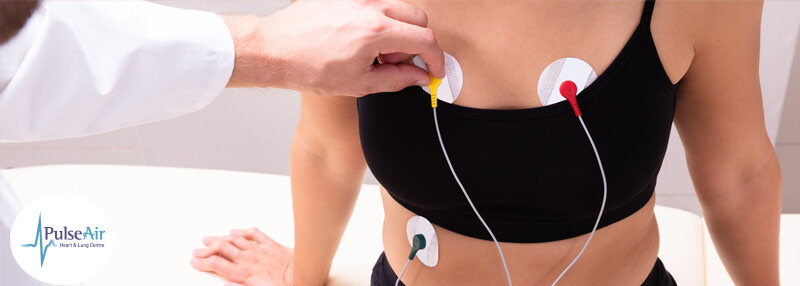A Holter monitor test is a non-invasive procedure used to continuously record the heart’s electrical activity, typically over 24 to 48 hours. It’s particularly useful for detecting irregular heart rhythms (arrhythmias) that may not be captured during a standard electrocardiogram (ECG or EKG).
How It Works
A Holter monitor is only one method clinicians use to monitor and diagnose heart conditions and is a longer version of EKG.
- Device: The Holter monitor is a small, wearable device connected to electrodes placed on your chest.
- Recording: It continuously records your heart’s activity as you go about your daily routine.
- Data Analysis: After the monitoring period, the data is analyzed by a healthcare provider to identify any irregularities.
Common Symptoms
A Holter monitor test is often recommended if you experience symptoms that suggest an irregular heartbeat or other heart-related issues. Common symptoms that may warrant the use of a Holter monitor include:
- Palpitations: Feeling like your heart is racing, fluttering, or skipping beats.
- Dizziness or Lightheadedness: Episodes of feeling faint or unsteady.
- Chest Pain: Unexplained chest discomfort or pain.
- Shortness of Breath: Difficulty breathing or feeling breathless without a clear cause.
- Fainting (Syncope): Unexplained episodes of losing consciousness.
- Fatigue: Persistent tiredness that doesn’t seem to have an obvious reason.
Preparation Tips
- Shower Beforehand: Since you won’t be able to shower while wearing the monitor, it’s best to bathe right before your appointment.
- Wear Comfortable Clothing: Opt for loose-fitting, button-down tops to make it easier to manage the device and electrodes.
- Avoid Certain Activities: You may need to avoid activities that could dislodge the electrodes or get the device wet.
- Follow Instructions: Your healthcare provider will give you specific instructions on how to handle the device and what to do if an electrode comes loose.
Possible Interferences
You can live your life as you usually would with a Holter monitor. However, the following activities may interfere with the results:
- Spending time near magnets or metal detectors
- Sweating excessively, which could cause the electrodes to detach.
If you have any common symptoms listed above, contact a trusted doctor for a consultation. PulseAir offers a variety of services for heart health, visit our page to check out all that we offer.


